News
2022: A year like no other
View(s):- The rise of protesters, the fall of Gotabaya Rajapaksa and the rise of Ranil Wickremesinghe
Without doubt, 2022 will go down in history as a year where some of the most momentous events in the country’s recent history played out amid much hardship and misery. For the first time in Sri Lanka’s history, a sitting Executive President was forced out of power by street protests that erupted due to the country’s worst financial crisis since independence.
It was a year of power cuts lasting 13 hours, crippling fuel, gas and medicine shortages, and the worst civil unrest since the end of the norhtern insurgency.
It was also a year where the attention of much of the world was focused on this island during the course of a few extraordinary months, as the masses mobilised in their tens of thousands to launch the ‘Aragalaya’ (struggle) that looked set briefly to shape the social and political fabric of the country for years to come. The Sunday Times looks back on some of the key developments of the past 12 months.
January
January 4 – President Gotabaya Rajapaksa removes State Minister Education Reforms, Open Universities and Distance Learning Promotion, Susil Premajayantha from his post. Mr Premajayantha was stripped from his position after he made a comment saying the “current administration had failed” while responding to a query from a journalist.
January 9 - President Gotabaya Rajapaksa requests China to help restructure debt repayments during a meeting with Chinese Foreign Minister Wang Yi in Colombo.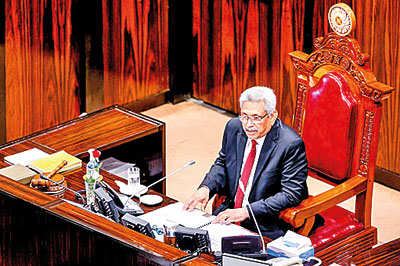
January 18 – President Rajapaksa declares open the Second Session of the Ninth Parliament and delivers his statement of government policy. In his speech, the President sets out goals for the government during the rest of his term.
January 19 – The Janatha Vimukthi Peramuna (JVP) launches protest against the agreement with India regarding the Trincomalee oil tank farm. The JVP alleges that the agreement will hand over the tanks over for Indian control.
January 25 – Two trawlers seized while carrying more than 330 kilograms of heroin with a street value of more than Rs. 3,300 million are brought to port by the Sri Lanka Navy. The trawlers, together with 11 local suspects, were arrested in a special operation by the Navy in international waters south of Sri Lanka.
February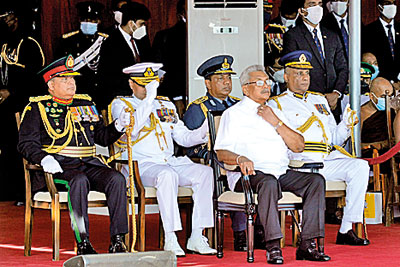
February 4 – Sri Lanka celebrates 74th Independence Day with main commemoration event held at Independence Square in Colombo under the patronage of President Gotabaya Rajapaksa. Opposition political parties including the Samagi Jana Balawegaya (SJB) and the JVP boycott the celebrations, as does the Catholic Church.
February 8 - Parliament sittings for February go ahead as party leaders decide against curtailing sessions after a mini COVID-19 cluster emerges from Parliament, with between 50 and 60 Parliament staff members and 14 MPs testing positive for COVID-19 since the ceremonial sitting of the Second Session of the Ninth Parliament on January 18.
February 11 – In a rare show of unity, both government and opposition MPs come together to move the vote of condolence on late MP Mangala Samaraweera. Prime Minister Mahinda Rajapaksa and Opposition Leader Sajith Premadasa lead the tributes.
February 18 – A three-judge Trial-at-Bar of the Colombo High Court acquits and releases former Defence Ministry Secretary Hemasiri Fernando and former Inspector General of Police (IGP) Pujith Jayasundara from charges of criminal negligence in failing to prevent the Easter Sunday terror attacks.
February 25 – The United Nations High Commissioner for Human Rights report on Sri Lanka’s human rights situation is released. The report states that the human rights situation in Sri Lanka is at an alarming decline and contradicts government claims.
March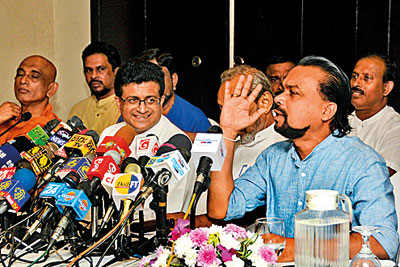
March 2 – Eleven constituent partners of the government launch a new national campaign titled, “Mulu Ratama Hari Magata” (the entire country towards the right path). The constituent partners are the Sri Lanka Freedom Party (SLFP), National Freedom Front (NFF), Communist Party of Sri Lanka (CP), Democratic Left Front (DLF), Sri Lanka Sama Samaja Party (LSSP), Pivithuru Hela Urumaya (PHU), National Congress, Sri Lanka Mahajana Party, Wijaya Dharani Jathika Sabawa, Eksath Mahajana Party and Yuthukama National Organization.
March 3 – A day after the launch of the “Mulu Ratama Hari Magata” event, President Gotabaya Rajapaksa removes Minister of Industries and NFF Leader Wimal Weerawansa and Minister of Energy and PHU Leader Udaya Gammanpila from their posts.
March 15 – Large crowds attend a protest march organised by the Samagi Jana Balawegaya (SJB) in Colombo. Opposition Leader Sajith Premadasa leads the crowds in the protest march, which begins from Viharamahadevi Park and ends opposite the Presidential Secretariat at Galle Face.
March 16 – Finance Minister Basil Rajapaksa meets Indian Prime Minister Narendra Modi in New Delhi.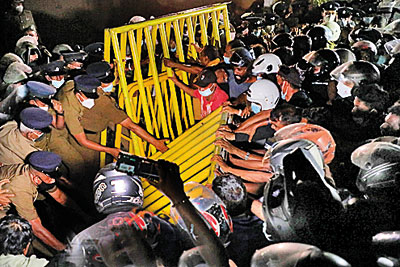
March 17 – India extends USD 1 billion credit line to Sri Lanka. The credit line facilitates the importation of essential commodities and pharmaceuticals to Sri Lanka.
March 31 – Protesters gather around the President’s personal residence in Pengiriwatta, Mirihana demanding immediate solutions to burning issues. Police fire teargas and water cannon, and launch a baton charge to disperse crowds. At least 50 are injured while several journalists are among 45 persons arrested over the incident.
April
April 1 – President Gotabaya Rajapaksa declares a state of emergency but protests continue.
April 2 – SJB member Hirunika Premachandra leads a group of supporters to surround the shrine of soothsayer Gnana Akka in Anuradhapura, but is stopped by Police.
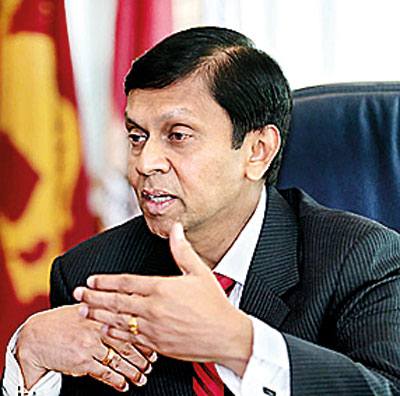 April 3 – The Cabinet resigns en masse except for the President and Prime Minister.
April 3 – The Cabinet resigns en masse except for the President and Prime Minister.
April 4 – Central Bank Governor Ajith Nivad Cabral submits his resignation
April 5 - Parliament reconvenes for the first time after the state of emergency is imposed. The Sri Lanka Podujana Peramuna (SLPP) loses support of SLFP, Ceylon Workers’ Congress (CWC) and All Ceylon Makkal Congress (ACMC) MPs who are in the government. Nine SLPP MPs decide to sit independently and 16 other parliamentarians, representing 10 political parties allied with the government, say they will function as independents in the House.
April 6 – SJB MPs protest in Parliament demanding the President’s resignation.
April 7 – Dr. Nandalal Weerasinghe appointed as the new Governor of the Central Bank.
April 9 - “Gotagogama” protest village established at Galle Face Green under the hashtag “#Occupy Galle Face” demanding the resignation of the President and Prime Minister.
April 14 – The Sinhala and Tamil New Year celebrated amidst mounting political unrest. Galle Face protesters also mark the New Year.
April 18 – New 17-member Cabinet appointed.
April 19 – Protests erupt in Rambukkana over the delay in fuel deliveries and sharp increase in fuel prices. Police use live bullets and tear gas to disperse protesters who block roads and the railway track. One protester is killed.
April 26 – Protesters establish “Mynagogama” in front of Temple Trees demanding that Prime Minister Mahinda Rajapaksa steps down.
April 28 – Over 1000 trade unions participate in an islandwide strike calling on the President and government to resign.
May
May 2 – Thangarasa Selvarani, a Tamil mother who had been protesting for more than 1,898 days passes away without ever finding out the whereabouts of her son, son-in-law and grandson, who had all disappeared.
May 3 – A no-confidence motion against the government and a motion to suspend Standing Orders to debate a motion expressing displeasure over the President handed over to Speaker by the SJB.
May 4 – Thirteen youths protesting in support of the No-Confidence motion against the government arrested outside Parliament under charges of accosting Parliamentarians. The arrests spark outrage resulting in hundreds of protesters gathering outside Parliament that night. “Horu Go Gama” is setup near Parliament despite tear gas being used to try and disperse protesters. Magistrate’s Court releases the youths on personal bail.
May 9 – Pro-government groups attack “GotaGoGama” protesters and destroy structures at the site. Thousands of supporters of the Aragalaya turn up at the site and violent clashes erupt across the island. Several MPs are attacked and Polonnaruwa District SLPP MP Amarakeerthi Athukorala and his bodyguard are killed by a mob. Mobs also attack, set fire to and loot houses of government aligned politicians in various parts of the island. Prime Minister Mahinda Rajapaksa steps down from post.
May 17 – The motion to suspend Standing Orders and debate the motion expressing displeasure against the President fails as it is defeated by a majority of 51 votes.
May 12 – Permanent People’s Tribunal in The Hague (Netherlands) begins hearings into the murder of Sri Lankan journalist and editor Lasantha Wickrematunge, based on an indictment presented by a coalition of international press freedom organisations.
May 12 – Ranil Wickremesinghe is appointed Prime Minister of Sri Lanka.
May 28 –GotaGoGama marks 50 days. Thousands take to the streets to mark the day.
June
June 2 – Aeroflot Controversy: A Russian Aeroflot flight is prevented from leaving the Bandaranaike International Airport (BIA) over a private commercial dispute resulting in diplomatic tensions between Sri Lanka and Russia.
June 11 – People take to the streets banging pots and pans in protest at rising cost of living. The first protest is held at Kohuwala Junction and protests erupt across the island.
June 16 – Anti-Adani protests are held in Colombo leading up to the Indian High Commission. Protesters demand the cancellation of the USD 500 million wind power agreement with India’s Adani Group over allegations of corruption.
June 18 – Education Ministry announces that all government schools in Colombo and suburbs, and all major towns across the island will be closed from June 20 to June 24 due to fuel shortages.
June 19 – Protesters band together to make a human chain from Prime Minister Ranil Wickremesinghe’s official residence at Temple Trees to ‘GotaGoGama’ in front of President Gotabaya Rajapaksa’s office asking the two to step down.
June 20 – The people’s protest marks 73rd day of dissent on Gotabaya Rajapaksa’s 73rd Birthday. Protests outside Presidential Secretariat gather momentum.
June 26 – Education Ministry announces that schools in the Colombo zone and other towns will remain closed for another week from June 27 to July 1 due to continuing fuel shortages.
July
July 6 – Former MP Hirunika Premachandra is arrested for protesting near the President’s House. The arrest sparks another protest and police use teargas.
July 8 – Inspector General of Police (IGP) Chandana Wickremasinghe imposes a police curfew which legal experts decry as illegal and unconstitutional. The IGP removes the curfew the next day.
July 9 – President Gotabaya Rajapaksa flees his official residence in Colombo before large numbers of protesters gather at Chatham Street, Colombo, near the President’s House, demanding his immediate resignation. Crowds subsequently storm the Presidential Secretariat, his official residence known as “President’s House” and Temple Trees, the Prime Minister’s official residence despite police barricades and tear gas attacks.
The protesters also gather around President Ranil Wickremesinghe’s private residence and attack his house, setting it on fire. At least 55 persons injured in the day’s unrest are admitted to the National Hospital.
Protesters who breach the President’s House, Temple Trees and Presidential Secretariat occupy these places refusing to leave until the Prime Minister and the President resign.
July 10 – The buildings taken over by the protesters, including President’s House and Temple Trees, become tourist attractions with large number of Sri Lankans visiting the buildings from different parts of the country .
July 13 – President Gotabaya Rajapaksa flees the country to the Maldives with his wife on a Sri Lanka Air Force aircraft. He then flies to Singapore on a commercial airline.
The same afternoon, Speaker Mahinda Yapa Abeywardena announces that President Rajapaksa has appointed Prime Minister Ranil Wickremesinghe as Acting President in his absence.
Protesters storm the office of the Prime Minister demanding his resignation. A group of protesters also storm the state-run television channel Sri Lanka Rupavahini Corporation demanding that news on the anti-government protests be broadcast. The channel briefly goes off the air. Acting President Ranil Wickremesinghe declares an island-wide curfew later that night.
July 14 – Protesters from Galle Face announce at a press conference that the protesters who are occupying President’s House and the Prime Minister’s Office will withdraw from those properties and hand them over to the state. However, they say that protesters will continue to remain at the Presidential Secretariat and Galle Face.
July 15 - Speaker Mahinda Yapa Abeywardena announces the official resignation of President Gotabaya Rajapaksa and Ranil Wickremesinghe is officially sworn in as the Acting President. Protesters rename “Gota Go Gama”, Ranil Go Gama” , demanding that Acting President Ranil Wickremesinghe step down.
July 20 – Parliament elects Acting President Ranil Wickremesinghe as Sri Lanka’s 8th Executive President by a majority vote. Mr Wickremesinghe receives 134 votes while his main challenger Dullas Alahapperuma receives 82 votes. Anura Kumara Dissanayake receives three votes.
– The Colombo Fort Magistrate issues a court order barring people from assembling within a 50-metre radius of the statue of the late S.W.R.D. Bandaranaike at the Galle Face Green after Colombo Fort Police make a request, citing reports of impending damage to the statue by protesters at Galle Face.
July 21 – Protesters at ‘No Deal Gama’, outside Temple Trees in Kollupitiya leave the protest site. Protesters at the Galle Face protest site announce they would release the President Secretariat back to authorities by 2 p.m. the next day.
July 22 – At around 2 a.m, armed forces from the Army, Police and Special Task Force storm the protest site at Galle Face Green to clear the Presidential Secretariat and remove the demonstrators. Diplomats and Human Rights Activists raise concerns over the attack on a peaceful protest at mid-night.
August
August 3 – Speaking at the ceremonial opening of the Third Session of the Ninth Parliament, President Wickremesinghe delivers a wide-ranging policy statement outlining a series of political and economic reforms. He also renews his appeal for parties to come together to form an all-party government to resolve the prevailing crisis and establish stability.
August 3 – Police issue ultimatum to remaining Galle Face protesters to remove all illegally set up tents and camps at the premises before 5 p.m. on August 5.
August 4 – During the consideration of three writ applications filed at the Court of Appeal on behalf of the protesters against the police’s ultimatum, the Attorney General assures that protesters will not be removed from Galle Face until August 10 without a court order.
August 9 – Countrywide protests erupt in main cities and towns. Unionists organised under the banner of the Trade Union Coordinating Committee demand an immediate dissolution of Parliament.
August 10 – On the 124th day of the Galle Face occupation, remaining protesters vacate the location.
August 23 – A delegation of the International Monetary Fund (IMF) arrives in the island for talks on economic and financial reforms.
September
September 1- The Value-Added Tax (VAT) is increased from 12 to 15 percent effective from September 1. This is the second increase of VAT for the year.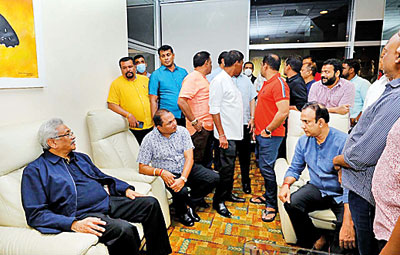
- Former President Gotabaya Rajapaksa arrives in the country from Thailand, nearly two months (50 days) after he fled the country amidst a massive uprising against him and the government.
September 3- Health, fuel, and power declared essential services through an extraordinary gazette notification signed by President Ranil Wickremesinghe.
September 4 - A new political alliance, ‘Uththara Lanka Sabhagaya’ is launched by independent political parties and parliamentarians including former ministers Vasudeva Nanayakkara, Tissa Vitharana, Wimal Weerawansa and Udaya Gammanpila.
September 14 – The Ministry of Public Administration and Home Affairs issues a circular to all state institutions making it compulsory to reduce the age of retirement to 60 years. This is to come into effect from January 1, 2023.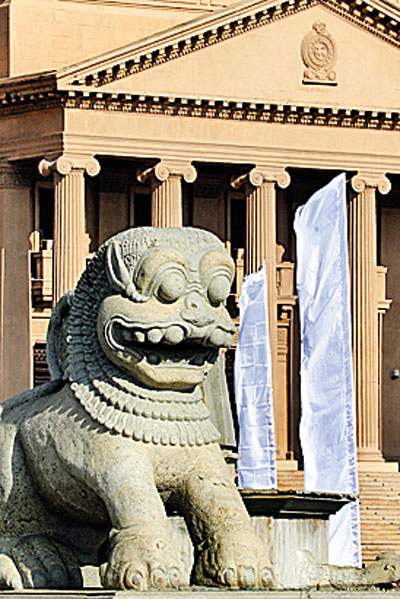
September 19 – Sri Lanka declares a Day of Mourning in view of the passing of Her Majesty Queen Elizabeth II, who was the Queen of Ceylon from 1952 to1972. The National Flag is also flown at half mast and a special government holiday is declared in view of the state funeral for the Queen.
September 20- More than one third of Sri Lanka’s population (37 percent) are presently facing acute food insecurity, World Food Programme report on household food insecurity reveals.
September 27- Eighty houses completely destroyed and over 300 persons displaced following a fire breaks out in Kajimawatte, Grandpass.
October
October 6 – Businesswoman Thilini Priyamali arrested and remanded over defrauding of three billion rupees from politicians, VIPs, businessmen and companies. CID also arrests her business partner Isuru Bandara.
October 8 – Former President Mahinda Rajapaksa appears in public for the first time since his resignation as Prime Minister in May. He attends the SLPP’s propaganda rally in Kalutara.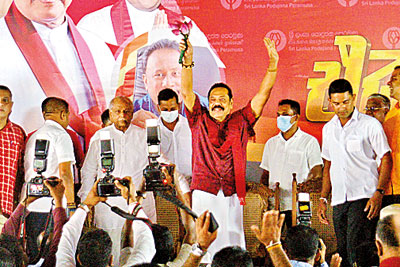
October 21 – The 21st Amendment to the Constitution, which repealed the 20th Amendment to the Constitution and reduced some Presidential powers, is passed by Parliament by 174 votes to 1. The amendment is passed after a two-day Parliamentary debate.
October 23 – State funeral held in Anuradhapura for Atamasthanadipathi Ven. Dr. Pallegama Siriniwasa Thera. The Thera (69) passes away on October 19 while receiving treatment at a hospital in Colombo.
October 23 – A group of luxury vehicles allegedly carrying several VIPs enter Yala National Park and engage in reckless driving. The Wildlife and Forest Resources Conservation Ministry subsequently blacklists 35 vehicles allegedly involved in the incident. Ten suspects, including a relative of Agriculture, Wildlife and Forest Resources Conservation Minister Mahinda Amaraweera are arrested over the incident and released on bail.
November
November 1- At least six million doses (about one million vials) of US-made Pfizer BioNTech vaccine against COVID-19 expires, causing a whopping loss of Rs. 1.4 billion to the Government.
November 4 – Sri Lanka detects its first case of monkeypox in a 21-year-old returnee from Dubai, United Arab Emirates (UAE).
November 5- Ministerial team, together with a separate unit is set up at the Presidential Secretariat to look into ethnic reconciliation and resolving the national issue with the support of all political parties represented in the Parliament.
November 11- Addressing the 27th Conference of Parties (COP27) of the signatories of the United Nations Framework Convention on Climate Change (UNFCC) in Egypt, President Ranil Wickremesinghe reiterates Sri Lanka’s call for climate compensation pointing out that Sri Lanka is one of the worst affected by rising emissions from the industrialised world.
November 14- President Wickremesinghe in his capacity as Minister of Finance presents Budget -2023 which focusses on steps needed to be taken to face the country’s worst-ever economic crisis.
November 17- An Extraordinary gazette notification is issued by the Registrar of Pesticides overturning the import ban on glyphosate, subject to licence controls.
November 19 – Presidential Secretariat Sub office of the Northern Province Development Special Unit is declared open by President Ranil Wickremesinghe with an assurance to resolve the outstanding land and other issues in the region.
November 21- Ruling on the fundamental rights petitions filed against the Inland Revenue (Amendment) Bill, a three – judge bench of the Supreme Court says it is wrong to assess the constitutionality of a proposed tax system on the basis of a prior tax system that has proven to be economically flawed.
November 25- Colombo High Court hears the case against eight accused over environmental damage caused to Sri Lanka’s coastline due to the X-Press Pearl disaster after the Attorney General filed indictments. The ship’s Russian Captain and local agent are among those indicted.
November 26 – COVID-19 virus makes a resurgence claiming eight lives amidst a fast-spreading influenza virus but the Health Ministry says there will be no preventive regulations introduced.
December
December 3- The Cabinet decides to grant long-term visas to foreigners who invest in the Colombo Stock Exchange, Treasury Bonds, condominium apartments, and other local investments, bringing in US dollar investments or deposits to the country.
December 7- The National Building Research Organization (NBRO), reports unhealthy air quality levels in many parts of Sri Lanka with the Air Quality Index (AQI) being between 150 and 200.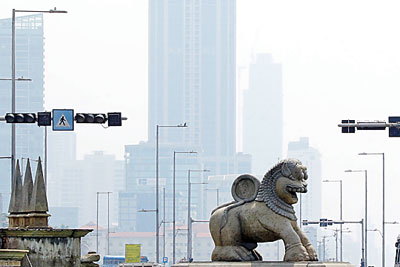
December 13- Flight operations at Palaly International Airport, Jaffna recommence after three years of closure due to the global pandemic since 2019.
December 14 – The government decides to suspend the import of rice except Basmati with immediate effect.
Compiled by Sandun Jayawardena, Kasun Warakapitiya, S. Rubatheesan, Nadia Fazlulhaq, Yoshitha Perera, Tharushi Weerasinghe and Senuka Jayakody
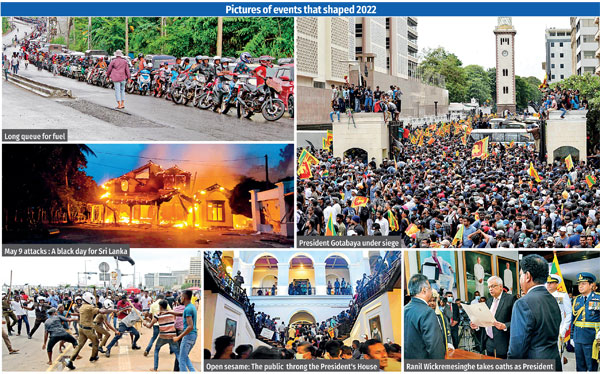
The best way to say that you found the home of your dreams is by finding it on Hitad.lk. We have listings for apartments for sale or rent in Sri Lanka, no matter what locale you're looking for! Whether you live in Colombo, Galle, Kandy, Matara, Jaffna and more - we've got them all!

